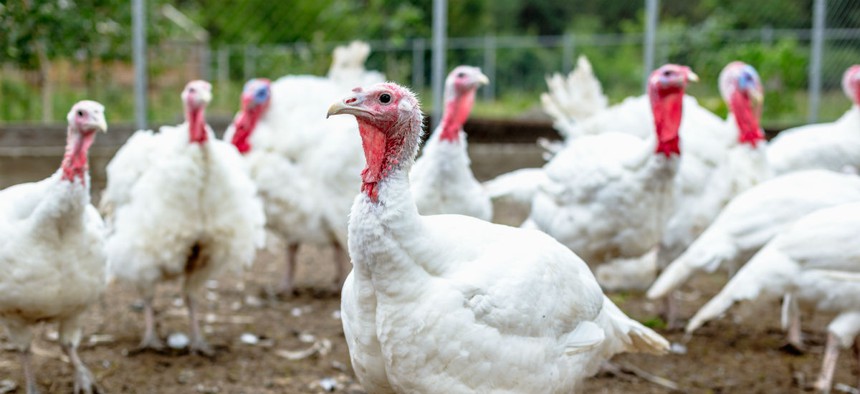Five Annoying Questions to Ask Your Grandparents at Thanksgiving
There’s no time like the holiday to explore the pressing issues of federal policy.
Thanksgiving is almost upon us. We love the turkey and sweet potatoes and mashed potatoes and stuffing. But many of us dread of the inevitable political battles that will pop up over dessert.
The drumstick stakes are YUGE. A November 2017 poll by the Cato Institute shows that 6 of every 10 Americans say that “the political climate prevents them from sharing their political beliefs.” Republicans are especially nervous—73 percent say “they keep some of their political beliefs to themselves,” compared with 53 percent for Democrats.
And, to make things even more uncomfortable, 71 percent of those surveyed “believe that political correctness has silenced important discussions our country needs to have.” Of course that’s before Uncle Fred has a few glasses of wine and decides that everyone needs to hear his opinions about everything.
So: How do you negotiate the dangers? One option is to stare into your plate and hope that no one says anything anyone might find objectionable. But that strategy doesn’t seem likely to work.
Another option is to get younger diners start the conversation, with questions sure to annoy their grandparents. Here are five puzzles to get you going.
First, Grandma and Grandpa, are you willing to save Social Security? We’re really glad you’re able to collect your Social Security payments from Uncle Sam every month, but what about us? There’s bad news: The Committee for a Responsible Federal Budget estimates that Social Security will go bankrupt in 2034.
The good news is that relatively modest changes, if they’re made now, would keep the program solvent when we’re your age and collecting payments. Are you willing to give up one percent of your annual cost-of-living adjustment to help save the program for us? That one change alone would get us halfway there. (If you’re game, try a helping of this instead of an extra spoonful of mashed potatoes.)
Second, as grandparents, are you bona fide members of our family? President Trump’s travel ban allowed people from banned countries who had a “bona fide relationship” with an American to enter the country, but the administration didn’t include grandparents. That came as a shock to many people who couldn’t imagine anyone more bona fide than a grandparent.
The Supreme Court stepped in to rule that grandparents ought to be admitted. But there’s a big question about who should enter the country. We don’t want to separate families. Where should we draw the line?
Third, Grandma and Grandpa, you’ve seen amazing changes in our country, much of it fueled by new vehicles and energy. You use appliances that your own grandparents could never have imagined. Your grandparents had radios the size of refrigerators, Model T cars that could fly along at a then-unimaginable 45 mph, and refrigerators that could actually hold ice. Now we have robot vacuum cleaners, Facebook and self-driving cars.
But how are we going to have enough energy to cook our turkeys when our grandkids gather? And can we do so without creating greater climate change and effects ranging from bigger snowstorms to more hurricanes? More than 90 percent of scientists believe that humans are making climate change worse. At least 70 percent of liberal Democrats trust those numbers. Only 15 percent of conservative Republicans do. What happens if we have to wait until we’re grandparents to figure out who’s right?
That relates to No. 4: Do we even have a common understanding of reality? “Fake news” isn’t new. Even Shakespeare indulged in disinformation campaigns that continue to distort historical perceptions to this day. But there was a time in the not too distant past when the majority of people “knew” things and believed in them. (Bad guys were communists, good guys were capitalists; they were red, and we wore red, white, and blue.) What was it like then? Are we worse off how? If so, how can we reclaim a sense of what to believe?
And, finally, Grandma and Grandpa, why is it so hard for us to talk about these things? It can’t do any of us any good if we don’t talk—or if, when we talk, we just yell at each other. Is there any way we can debate these things civilly?
Many of us love the Broadway musical, Hamilton. One of the musical’s big numbers is “The Room Where It Happens.” It’s about a couple of guys who couldn’t stand each other—Thomas Jefferson and Alexander Hamilton—and their fight over some really nasty policy battles.
But they got together, had dinner like we just did (though they had capon instead of turkey), drank some wine, and figured out a compromise: a plan that set the stage for the new nation’s economy and placed its capital in the federal District of Columbia, named in honor of President George Washington.
Maybe that’s not such a bad plan. Let’s have a glass of wine or two, and make our table the room where it happens—where we talk about the big things and find a way to lay the foundation for the country you want to leave for us, so we can leave an even better one for our grandkids.
But let’s decide to just let Uncle Fred sip his wine and then doze off in the corner.








